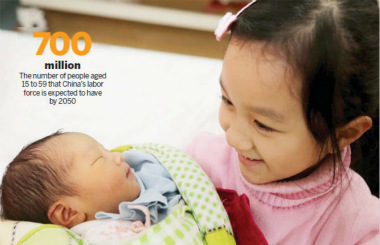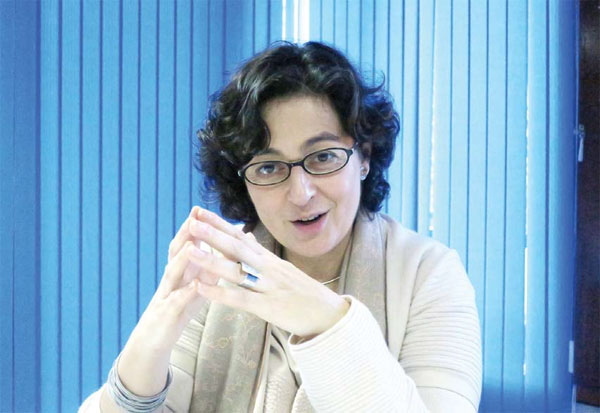Holding up half the African sky
Updated: 2016-01-22 08:41
By Lucie Morangi(China Daily Europe)
|
|||||||||||
|
|
China joins with Geneva-based group to link continent's SMEs, including women's enterprises, to global trade
China is working with the International Trade Centre, a 50-year-old, Geneva-based organization, to build the competitiveness of smaller African businesses and link them to the global value chain.
This move, including a focus on female-owned enterprises, is lifting millions of families from poverty, as jobs are created and higher wages earned, officials say.
ITC, a joint mandate of the World Trade Organization and the United Nations, bills itself as "the only multilateral agency fully dedicated to supporting the internationalization" of small and medium-sized enterprises.
"We implement the benefits found in multilateral agreements made possible by WTO and employ it in fighting poverty, a mandate of the UN," explains ITC Executive Director Arancha Gonzalez.
Gonzalez, speaking to China Daily on the sidelines of the 10th WTO Ministerial Meeting in Nairobi in December, said China's support has boosted ITC's programs in sub-Saharan Africa, where pockets of poverty remain. The agency aims to enable a million more women entrepreneurs to enter global markets by 2020.

"We believe that trade is the solution to fighting poverty, and by supporting businesses in these countries a greater impact is achieved," says Gonzalez, who previously served as chief of staff to former WTO director-general Pascal Lamy, who served from 2005 to 2013.
In November, ITC launched a program linking Chinese businesses to Africa, and African businesses to China, with the support of the China-Africa Development Fund, a Chinese government-controlled equity fund, and the Department for International Development, the British government's development arm. The program covers Kenya, Ethiopia, Zambia and Mozambique.
"We are trying to build value-chain growth in enterprises found along the northern corridor. Essentially at this stage we are identifying value chains before creating linkages between businesses found along the corridor," Gonzalez says.
The corridor is a transport route that connects the port of Mombasa in Kenya to countries in the interior of East and Central Africa. These include Uganda, Rwanda, Burundi and the Democratic Republic of Congo. The route also includes Ethiopia, where efforts are being made to support the leather industry, a sector in which Chinese companies have a huge stake.
The program's target is micro, small and medium enterprises. Gonzalez says she is encouraged by the planned relocation of some Chinese industries into the region. She says they offer opportunities for Africa to increase its participation in global trade.
The firms are subsidiaries of Chinese parent companies that have experience engaging in existing sophisticated production processes and already have a hold in global trade chains. They are well-prepared to help Africa increase its exports of finished goods.
Although industrialization is Africa's strongest ambition, Gonzalez says focus should be broadened to economic transformation. That means broader and deeper participation by a variety of enterprises, and the inclusion of groups such as women and youths.
"This concept means improving the productivity of all factors of production. Improving agriculture processing, packaging, branding and marketing services, which encompasses two-thirds of some African countries' economies, such as in Nigeria, Ghana and Kenya," Gonzalez says.
China's ongoing engagement with Africa has broken the yoke of aid dependency, which was neither sustainable nor practical, she says. "What we are working on at the moment, together with China, is converging development aid, the private sector and trading. This is a powerful recipe."
ITC has been able to convince Chinese investors to invest in Africa by providing market intelligence. It also is helping African businesses navigate the Chinese market.
"We are a bridge between the knowledge gap existing between Chinese and African businesses. Businesses in Africa and Europe have known each other for centuries. But China-Africa businesses are new, so it is about getting to know each other a little bit better."
Trade is breaking down barriers between the two partners, she says, and the relocation of Chinese businesses to Africa is a strong indication of that.
"This is happening. In the long run, it buoys efforts to reduce poverty by using market mechanisms so that enterprises become sustainable and eventually makes aid redundant," she says.
Ongoing programs are in honey production in Zambia, the leather industry in Ethiopia, the spices value chain in Tanzania and Zanzibar, fruit and tea processing in Kenya and cotton production in Malawi.
Gonzalez believes that a bigger market, stable political environment and attractive laws and regulations will make Africa an attractive investment destination for Chinese firms. "They also need funds to sustain them through the difficult infancy period," she says.
Africa also needs modern infrastructure and reliable energy sources to operate seamlessly and competitively, a common challenge for African governments.
Recently, China has become more involved in narrowing the gap. Some infrastructure projects are cross-border and help fulfill Africa's ambition to integrate, creating a bigger market of consumers. That not only means improvements in skills and employment for the bulging, youthful populations of sub-Saharan Africa, but also a rise in foreign direct investment.
Still, Gonzalez says she thinks there should be deliberate development of policies supporting the participation of women and youths.
"It should start from socially and culturally promoting women-led entrepreneurship. Second is providing equal opportunities for women to participate in trading such as access to finance since they have no collateral."
In 2013, Kenyan President Uhuru Kenyatta set in motion the amendment of government procurement rules to allow 30 percent of contracts to be given to youth, women and persons with disability without competition from established firms.
"Annual global procurement is worth $15 trillion a year," Gonzalez says. "Only 1 percent is serviced by women-led enterprises. We need to address this market failure, and that is why we hosted a women's business forum here in Nairobi to highlight this issue."
She says the impact of the fourth World Conference on Women, held in 1995 in Beijing, is still being felt today.
"It was about setting the agenda to highlight the glaring gender gap. Twenty years later, it is not a question of whether or not we need to tackle the gender gap, because the Beijing conference highlighted the usefulness of including women in economies, political systems, governments and businesses. The next 20 years will be about accelerating the closure of the gender gap."
She says Africa is already benefiting from such moves and points to Rwanda, where women occupy 65 percent of parliamentary seats, the highest proportion in the world. "Beijing created the space and expectations of what women bring to the table. The event was a game-changer."
Such preferential policies, however, are in force in few of the WTO'S 164 member states, which makes the organization less relevant for market integration. But Gonzalez says its usefulness would become more evident with a strengthening of the organization's negotiating arm.
"WTO has been extremely useful in settling disputes and expanding member partners. Countries are turning more and more to it to settle disputes and, in my opinion, this is an indication that it is a good litigator. But we also have to ensure that WTO is effective in negotiations.
"The public perception is that the trade agency is for big business, and this is not true. WTO is mostly about SMEs. Big multinationals can find their way around. SMEs are the ones in need of a level playing field because they cannot navigate the myriad trade agreements and trade rules. For them, every cost counts," she says.
lucymorangi@chinadaily.com.cn
Today's Top News
Global push
'More Europe' to deal with 'triple crisis'
China gives beleaguered Tsipras a helping hand
China injects note of confidence in Davos
China and Gulf nations resume free trade talks
IMF starts to select new chief
Merkel insists on European solution for refugee crisis
China, Saudi Arabia sign deals on Xi's visit
Hot Topics
Lunar probe , China growth forecasts, Emission rules get tougher, China seen through 'colored lens', International board,
Editor's Picks

|

|

|

|

|

|







